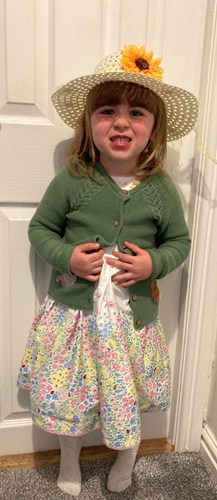How we help our daughter get a good night's sleep
Published Date: 20 May 2021
I turn over sleepily and remember it’s the weekend - no work to get up for and nothing but a blissful lay-in ahead. Nope, just dreaming! The reality of course is my three-year-old bounding in shouting, “The sun is up!” Sleep was definitely never fully appreciated until my little slumber snatcher came along.
Back in 2018, whilst getting to grips with being first-time parents wondering what wizardry makes babies sleep, my husband and I also had to figure out if we needed to make any adaptations. Isabelle doesn’t wear her devices in bed so she has a completely silent night just like me - in fact I couldn’t imagine putting up with noise overnight (No snoring issues in this relationship!) My own experience as a deaf adult definitely helps me empathise with any hearing difficulties I feel Isabelle may face.
Bedtime can be scary when two key senses are taken away - namely hearing and then a pitch black room taking away sight too. So we bought a red star projector for Isabelle which she’s had since she was tiny, meaning the room is never pitch black. We also realised how important it was to be tactile during bedtime and whilst resettling Isabelle at night. Our touch is the comfort she needs when we can’t use a soothing tone of voice like you may do with a hearing child. This has adapted to her individual needs over the years, from falling asleep in our arms, to holding her hand as she fell asleep, to simply cuddles before bed. Even now, we will sit outside the room with the door ajar until she falls asleep so she has a visual to make her feel secure. Without this you see, she has no idea where we are in the house. We briefly experimented with putting one of our t-shirts over her cot mattress - thinking she may gain comfort from our familiar scent - but she wasn’t fussed, I guess we don’t smell of roses! It’s all trial and error.
Her bedtime routine is particularly solid which is vital because for the majority of it she’s without hearing - in the bath, drying hair etc. Whilst we sign and she lip-reads, the fact she knows implicitly what comes next reduces any toddler stand-offs compounded by a refusal to look at us to communicate! Kids! In addition she has a Gro Clock in her room which indicates when it is night-time, with stars that change to sunlight when morning arrives. This has really helped clarify when it’s time to get up or to stay in bed, with a clear and simple visual useful for when we can’t easily communicate in the low lighting of the night.
In the morning, Isabelle doesn’t like to wear her processors straight away, probably not for the first hour in fact. I’m exactly the same. After a whole night of peace, I’m in no rush for a barrage of sound. Once on, she doesn’t take them off until bedtime so we’re more than happy to give her autonomy over when the sounds of her day start. It’s taken a long time to get Isabelle regularly sleeping through and she woke several times a night for her first two years. However, speaking to friends I know this isn’t necessarily hearing related as their children were all the same. Sleep is developmental and I’ve done an awful lot of reading on it - sometimes out of desperation after a sleepless night! I’ve come to realise that yes we’ve made specific adaptations for our daughter based on her needs, but so does every parent. Every child gets there in their own time. If you’re not there yet - stock up on coffee and chocolate!
